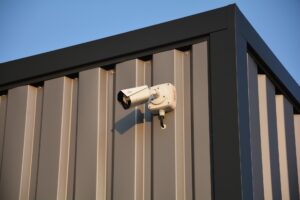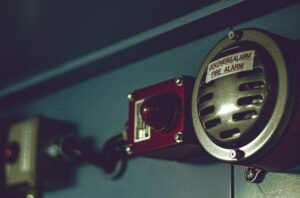Fire alarms and carbon monoxide detectors serve as essential safeguards in homes, yet many people confuse their functions and capabilities. While both devices protect against potentially deadly hazards, they operate on different principles and detect distinct threats that require specific technologies to identify effectively.
Fire alarms and carbon monoxide detectors are typically separate devices designed for different hazards, though combination units exist. Standard smoke detectors cannot detect carbon monoxide without specialised sensors specifically designed for this purpose. Understanding the difference between alarms and smoke detection is key for fire safety.
Key Takeaways
- Standard smoke alarms don’t detect carbon monoxide unless they’re specifically designed as combination devices (like combination smoke and carbon monoxide units).
- About 60% of fire deaths occur in homes without working smoke alarms.
- Carbon monoxide is an invisible and odourless killer, causing over 400 American deaths annually.
- Combination alarms provide dual protection using different alert sounds to distinguish between hazards.
- Both types of alarms require regular testing and maintenance with different placement strategies for optimal protection.
Understanding the Difference Between Fire Alarms and CO Detectors
Fire alarms and carbon monoxide detectors address fundamentally different safety risks. While they might look similar, these devices employ separate technologies to detect their respective hazards. Standard smoke detectors can’t sense carbon monoxide gas, just as basic CO detectors won’t alert you to smoke from a fire.
The statistics highlight why both types of protection are critical. Nearly 60% of residential fire fatalities happen in homes lacking functional smoke alarms. Meanwhile, carbon monoxide poisoning claims over 400 American lives yearly, often because this colourless, odourless, tasteless, poisonous gas goes undetected without proper equipment like a carbon monoxide alarm.
The confusion often stems from the availability of combination devices (smoke and carbon monoxide detectors) that perform both functions. However, it’s important to understand that a traditional smoke alarm isn’t automatically equipped with carbon monoxide detection capability unless specifically designed and labelled as a dual-purpose unit, sometimes referred to as a smoke and co alarm.
Combination Alarms: When One Device Does Both Jobs
Combination alarms (like combination smoke and carbon monoxide alarms) offer the convenience of integrating multiple detection functions into a single unit. These devices contain separate sensors for detecting smoke particles and the presence of carbon monoxide gas. To differentiate between the two hazards, they typically use distinct alert patterns or voice notifications that specify whether smoke or carbon monoxide has been detected. Popular models include the FireAngel SCB10-R or Kidde 10SCO.
Priced between £35 and £100, combination alarms can be cost-effective while reducing device clutter on ceilings and walls. Higher-end smart models connect to home automation systems and can send alerts directly to your smartphone when danger is detected. This provides reassurance even when you’re away from home. Some models are mains-powered with backup battery, while others are solely battery powered. Options with a 10-year longlife battery are also available.
The benefits of combination alarms include:
- Simplified maintenance with fewer devices to test and maintain
- Reduced clutter on walls and ceilings
- Cost efficiency compared to purchasing separate devices
- Consistent aesthetic throughout your home
How Smoke Detectors Work: Technology Behind Fire Detection
Smoke detectors rely on two primary technologies to identify fire hazards. Ionisation detectors excel at sensing fast-flaming fires, responding 30-90 seconds faster than other types when flames generate smaller smoke particles. They use a small amount of radioactive material to ionise air molecules and detect changes when smoke particles enter the chamber.
Photoelectric detectors (sometimes called optical smoke alarms), on the other hand, are more sensitive to smouldering, smoky fires that might burn for hours before erupting into flames. These detectors use a light beam that, when interrupted by the presence of smoke particles, triggers the alarm. They respond 15-50 minutes faster to smouldering fires than ionisation models. Heat alarms are another type, detecting temperature increases rather than smoke, suitable for kitchens.
For comprehensive fire protection, dual-sensor smoke alarms incorporate both technologies. This combination provides the fastest response to either type of fire, though these units typically cost more than single-sensor detectors. The National Fire Protection Association recommends installing alarms of both types or dual-sensor units throughout your home for optimal safety. Options like Aico offer various detector types.
Carbon Monoxide Detection: A Different Safety Challenge
Carbon monoxide presents unique detection challenges because it’s impossible to detect without specialized equipment. Unlike smoke, which you can see and smell, carbon monoxide gives no sensory warning signs before causing symptoms (often flu-like) and potentially death. This makes dedicated detection technology essential. A carbon monoxide meter or detector is crucial.
CO detectors typically sound an alarm when they detect 70 parts per million (ppm) after 60-240 minutes of exposure, which is well before most people would experience serious symptoms. These devices use either electrochemical or biomimetic sensors that have lifespans of 5-10 years, shorter than most smoke detectors. Some models like the Kidde K10SCO are widely available.
An important distinction in placement requirements stems from the physical properties of each hazard. While smoke rises to the ceiling, carbon monoxide disperses evenly throughout a room. This affects where each type of detector should be installed for maximum effectiveness.
Proper Placement for Maximum Protection
The physical properties of smoke and carbon monoxide dictate different placement strategies for their respective detectors. Smoke alarms should be installed on every level (every floor) of your home, including the basement, with units inside each bedroom and outside sleeping areas. Since smoke rises, ceiling placement is ideal. They must be installed on every storey used as living accommodation.
Carbon monoxide detectors have different placement requirements. Because CO gas disperses evenly in air rather than rising, these detectors can be effective when placed at any height, often recommended at head height. However, they should be positioned near sleeping areas and at least 15 feet (or 1 to 3 metres) away from fuel-burning appliances (boiler, cooker, stove) to prevent false alarms. Carbon monoxide alarms must be placed correctly for early warnings.
For combination alarms, strategic placement becomes even more important. Consider these guidelines:
- Install on each level of your home, including basements
- Place inside and outside each sleeping area
- Position at least 10 feet from cooking appliances to reduce false alarms
- Keep away from windows, doors, and vents where airflow might interfere with detection
Maintenance Requirements for Both Safety Devices
Regular maintenance is essential for ensuring your fire alarm and carbon monoxide detectors function properly when needed. The National Fire Protection Association recommends testing all alarms monthly by pressing the test button until the alert sounds. Additionally, batteries in battery-powered units should be replaced at least once yearly, or whenever the low-battery warning chirps. Look for units with a 10-year battery for convenience.
Replacement schedules differ between device types. Smoke alarms should be completely replaced every 10 years, while most carbon monoxide detectors need replacement after 5-7 years (10 yr models exist) as their sensors degrade over time. The manufacturing date is typically printed on the back of the device.
The consequences of neglecting maintenance can be fatal. Statistics show that 3 out of 5 home fire deaths occur in properties without working smoke alarms. Similar risks apply to carbon monoxide detection, making regular maintenance a life-saving habit.
Smart and Interconnected Alarm Systems
Modern safety technology offers advanced protection through interconnected alarm systems (wireless interlinked alarms are common). These systems link multiple detectors throughout your home so that when one unit detects danger, all alarms sound simultaneously. This feature is particularly valuable in larger homes where an occupant might not hear an alarm sounding in a distant room.
Smart alarms take protection further by connecting to home Wi-Fi networks and sending alerts directly to smartphones. Some integrate with broader home automation and security systems, allowing remote monitoring and control. These features provide enhanced protection and reassurance, especially when you’re away from home.
While traditional battery-operated alarms remain effective, the advantages of interconnected systems include:
- Faster awareness of danger throughout the entire home
- Remote notifications when you’re away
- Integration with existing smart home systems
- Enhanced protection for family members who might sleep through distant alarms
Regulations and Recommendations from Safety Authorities
Safety organisations provide clear guidelines for home protection against fire and carbon monoxide. The National Fire Protection Association, Centres for Disease Control and Prevention, and U.S. Fire Administration all recommend installing both types of detection throughout your home.
Many local jurisdictions have adopted building codes that legally require smoke detectors in all residential buildings (British Standards BS compliance is often needed). Carbon monoxide detector requirements vary by location but are increasingly becoming mandatory (legal requirement), especially in homes with fuel-burning appliances or attached garages. For landlords, specific regulations often apply to protect properties and tenants, especially in social housing.
The consensus among safety experts is that the best practice includes having both dedicated detectors and combination units strategically placed throughout your home. This layered approach provides comprehensive protection against these distinct but equally dangerous hazards. You can buy smoke and CO alarms from many retailers, including places like Screwfix, which often offer free delivery or have stores nationwide.
Sources:
allstate.com – Types of Smoke Detectors
consumerreports.org – Best Smoke and Carbon Monoxide Detectors












